|
|
|
Sort Order |
|
|
|
Items / Page
|
|
|
|
|
|
|
| Srl | Item |
| 1 |
ID:
156275
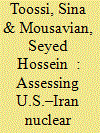

|
|
|
| 2 |
ID:
119771
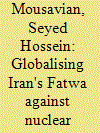

|
|
|
| 3 |
ID:
176596
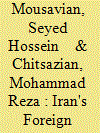

|
|
|
|
|
| Summary/Abstract |
Four decades after the Islamic revolution in Iran, when countries across the globe are grappling with the Covid‐19 pandemic, analyzing Iran's Middle East policy may seem eccentric. However, in the lead‐up to the U.S. presidential election and the end of Donald Trump's first term, the Middle East is drenched in chaos, instability and upheaval. The Israel‐Palestine conflict continues, and the Israeli government has declared it intends to annex part of the West Bank. Trump has formally recognized Jerusalem as the capital of Israel and Israel's annexation of the Golan Heights. Tehran no longer commits to the limits set by the nuclear deal, the Joint Comprehensive Plan of Action (JCPOA),∗ as long as the Trump administration pursues maximum pressure on Iran and a “No War, No Peace” strategy in the Middle East. In Iraq, tensions have escalated between the United States and Iran, fueling conflict while Baghdad lacks a strong and functional central government. Iran fired missiles in retaliation for the U.S. strike that killed General Qasem Soleimani, the commander of Iran's Quds Force, the external affairs branch of the Islamic Revolutionary Guard Corps (IRGC).
|
|
|
|
|
|
|
|
|
|
|
|
|
|
|
|
| 4 |
ID:
177471
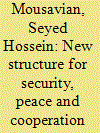

|
|
|
|
|
| Publication |
Lanham, Rowman and Littlefield, 2020.
|
| Description |
xiii, 183p.hbk
|
| Standard Number |
9781538146507
|
|
|
|
|
|
|
|
|
|
|
|
Copies: C:1/I:0,R:0,Q:0
Circulation
| Accession# | Call# | Current Location | Status | Policy | Location |
| 059991 | 355.0330536/MOU 059991 | Main | On Shelf | General | |
|
|
|
|
| 5 |
ID:
135283
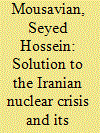

|
|
|
|
|
| Summary/Abstract |
After a decade of failed nuclear negotiations between Iran and the five permanent members of the UN Security Council plus Germany (P5+1), they have finally fleshed out a temporary agreement that will hopefully restore trust in the peaceful character of Iran's nuclear program among all parties. To do so, the temporary agreement must become the basis for renewed discussions on a final deal and the contours of a regional nuclear order in the Middle East. In a broader sense, the outcome of the nuclear negotiations with Iran will have a profound impact on nuclear nonproliferation, a nuclear weapons−free zone (NWFZ), and a zone free of nuclear weapons and of other weapons of mass destruction and their delivery systems (WMDFZ) in the Middle East. This article examines the consequences of the breakthrough in nuclear talks between Iran and the P5+1. A negotiated settlement will be based on the framework of the Nuclear Non-Proliferation Treaty, with measures to address key demands from all parties involved. For the P5+1, this includes transparency and verification over the nature of the Iranian nuclear program, ensuring there will be no breakout. Iran's main demand includes respecting its rights under the NPT, including enrichment and lifting sanctions, as negotiated in the November 2013 interim agreement between it and the P5+1. Furthermore, a permanent settlement on the Iranian nuclear issue will inevitably introduce modified and newly formulated measures and technical modalities at the regional level, which will enhance nonproliferation efforts. These milestones, which are described in this article, will pave the way toward strengthening the call for concerted efforts to realize a WMDFZ in the Middle East and will help preserve the global nuclear nonproliferation regime in the future.
|
|
|
|
|
|
|
|
|
|
|
|
|
|
|
|
|
|
|
|
|